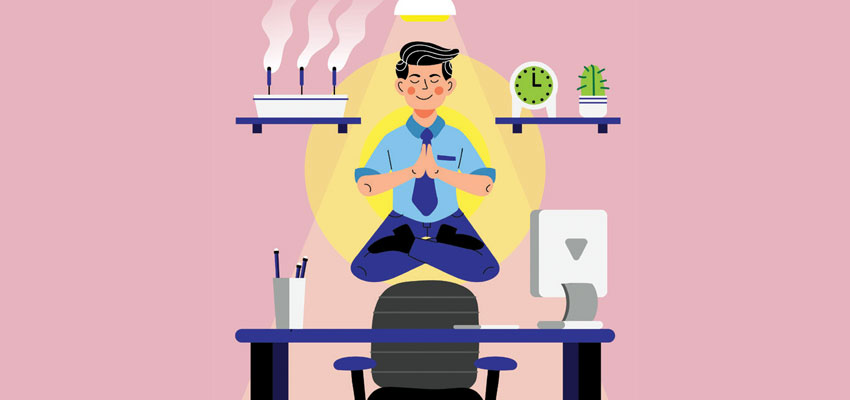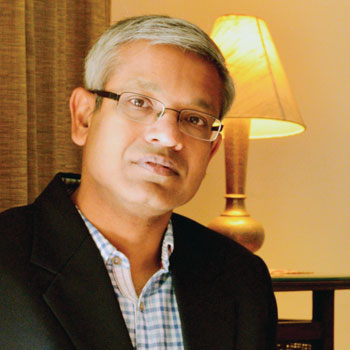Stay Grounded

With a career spanning over 30 years, Samit Jain, MD, PLUSS Advanced Technologies, has held leadership position with technology companies. As the Managing Director, he leads and oversees the overall operations and business strategy of PLUSS, a materials research and manufacturing company. Samit Jain is also a Trustee of the Advit Foundation, a non-governmental development organisation, working for environmental conservation and livelihood enhancement. In an exclusive interview with Corporate Citizen, he talks about his work philosophy and how he maintains work-life balance
Corporate Citizen: How do you set out your priorities to keep your work and personal life balanced?
Samit Jain: I believe that today with changing needs one needs to take the effort of work-life integration rather than calling it as work-life balance. If you enjoy doing what you are doing and believe in the purpose that it will achieve, work is enjoyable at senior positions—it is often not possible to not stay connected to work on weekends or off work hours, as my employees are dependent on me for certain decisions, and it becomes my responsibility to ensure that I support them. However, I consciously decide to not respond to e-mails or messages that are not urgent or necessary on a weekend. When on leave or vacation, I decide to respond to messages and calls for set hours during the day. India being one of the most diverse countries in the world both in terms of festivals and religions, we need to really integrate work into our lives as each employee will have different occasions, on when they are on leave. But, doing it in a disciplined way is important.
CC: While on the move what helps you in maintaining calm and peace?
When on the move, especially in Indian cities and traffic, the best way I feel is to take deep breaths, it really helps in calming you down. Also, to be able to enjoy and take in the diversity that you see when travelling – observing people, habits, mannerisms and nature, help me divert my mind. I always have a book along with me that I like to flip through, if the surroundings are disturbing. If travelling overseas, the environment is usually less chaotic. I take the opportunity to walk a lot if the weather permits, maybe even walk to meetings and allow for the extra time. My running shoes are always with me when I am travelling, and that keeps me alert through the day.
CC: What keeps you fit and healthy? Share the ways you keep your mind calm and cool.
I enjoy running and walking anywhere. I tend to choose hotels that are close to places I can run or go for a walk. If not, I practice a few yoga asanas or Surya Namaskar. I make it a point to do it for 30 to 45 minutes every day. A control on diet, of course, helps a lot. Today, the younger generation tends to believe that medicines and doctors are the cure-all for any illness. I believe it is best to let the body recover without medicines. It usually does. I eat almost anything vegetarian and enjoy sweets. Of late, I tend to avoid packaged or instant foods and believe that the Indian food system, which we have lost touch with, due to westernisation, have a lot of lessons for us to help us stay healthy.
CC: Your stress busters? How do you like to rejuvenate and recharge? What do you like to do in your free time?
Gardening, reading novels and biographies, and long walks.
"We should not always look at whether we have been successful or whether we have failed.It is so subjective. We should enjoy the process and not worry about the result."
-Samit Jain
CC: Five tips that work best for you to maintain work-life balance.
- Disciplined routine. Have a fixed time to leave home every day for work; leave early when the weather is not right.
- On vacations and holidays, allot a fixed time slot, if possible two or three times a day for myself.
- Make a list for what is urgent for the next day, the previous day itself.
- Delegate but not abdicate—check in constantly without micromanaging, that helps avoid surprises.
- Remembering, perfection is not always important, and accepting that not everything will go my way.
CC: Do you play any game which helps you in your work? How does it help? What are the lessons the game teaches for life?

While I follow sports, I am not a sports fan. Long distance running and marathons, however are my best sports. Marathons have taught me to be resilient and push myself even when I am tired. They have several lessons for life. For instance, you can’t just wake up one morning and decide to run a marathon. You need to prepare for it. So is it in work and life. Success comes after a lot of hard work and preparation. It teaches you to think of smaller goals rather than completing the 42 km. Similarly, celebrate small successes— your ultimate goal is a series of smaller goals. It also teaches you that you need to take care of yourself and your health, if you want to run a long marathon. Life is just like that—to be successful, your health comes first.
CC: What is the secret of your success?
Am I successful? I think we should not always look at whether we have been successful or whether we have failed. It is so subjective.We should enjoy the process and not worry about the result. Remember that we should do our best; we can’t do better. Every action will have a result – good or bad, and make sure you learn from that. That will keep you motivated for the next step. Remember the larger purpose of your work and actions, and you will feel successful always.
CC: What is your philosophy of work?
This question reminds me of what Sigmund Freud once said in one of his works “Man needs both love and work for happiness”. As human beings, we are meant to work. Try not doing anything for days together, you cannot. I believe that work is our first duty. It allows us to do everything else in life that we want to do, especially if we look at the capitalist society that we are a part of. And, I greatly believe in the Sanskrit shloka “Karmanye Vadhikaraste, Ma Phaleshu Kadachana” (You have the right to perform your actions, but you are not entitled to the fruits of the actions). Ma Karma Phala Hetur Bhurmatey Sangostva Akarmani (Do not let the fruit be the purpose of your actions), and therefore you won’t be attached to not doing your duty.
CC: What lesson would you like to give to youngsters on time management, hobby management, profession management.
It is important to visualise how your time is spent each day. That will allow you to ensure that you have time for work as well as your hobbies. Youngsters often feel that once out of school or college, they don’t need to stick to time. Discipline makes it easier to handle pressures of today. It makes it easier on the body too and thereby your health. Youngsters should also remember, that the highest degree of freedom comes with the highest degree of discipline.
CC: What dreams remain to be fulfilled?
I had to give up my hobbies of learning languages and playing the sitar. Hope to take it up one day.
CC: Where do we see you 10 years from now?
I would love spending my time giving back to society and working for the environment conservation. I hope to be able to do that.